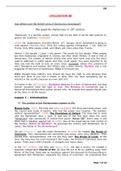Notes de cours
CM Civilization GB
Note
Vendu
-
Pages
24
Publié le
04-05-2019
Écrit en
2018/2019
Courses of Civilization GB - S6 L3 LLCE English
Établissement
Cours
Oups, quelque chose ne va pas.
À cause d'une erreur technique, nous ne pouvons vous montrer le document sur la visionneuse en ligne.
Veuillez essayer de télécharger le fichier ou contactez notre équipe d’assistance.
École, étude et sujet
- Établissement
- Université de reims champagne ardenne
- Cours
- LLCE Anglais
- Cours
- Civilisation GB
Tous les documents sur ce sujet (2)
Infos sur le Document
- Publié le
- May 4, 2019
- Nombre de pages
- 24
- Écrit en
- 2018/2019
- Type
- Class notes
- Professeur(s)
- Inconnu
- Contenu
- All classes
Sujets
-
llce english civi civilization gb uk l3
€6.68
Accéder à l'intégralité du document:
Garantie de satisfaction à 100%
Disponible immédiatement après paiement
En ligne et en PDF
Tu n'es lié à rien
Faites connaissance avec le vendeur
Callianthemum_Naso.lopezi
Document également disponible en groupe

Package deal
Licence LLCE L3 S6
43
2019
€ 335.21
Plus d'infos

